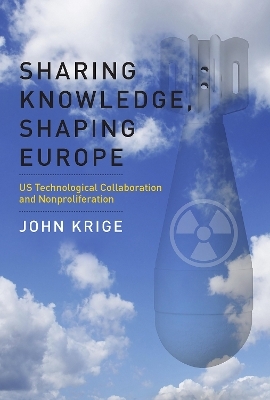
Sharing Knowledge, Shaping Europe
US Technological Collaboration and Nonproliferation
Seiten
2016
MIT Press (Verlag)
978-0-262-03477-7 (ISBN)
MIT Press (Verlag)
978-0-262-03477-7 (ISBN)
- Keine Verlagsinformationen verfügbar
- Artikel merken
How America used its technological leadership in the 1950s and the 1960s to foster European collaboration and curb nuclear proliferation, with varying degrees of success.
In the 1950s and the 1960s, U.S. administrations were determined to prevent Western European countries from developing independent national nuclear weapons programs. To do so, the United States attempted to use its technological pre-eminence as a tool of "soft power" to steer Western European technological choices toward the peaceful uses of the atom and of space, encouraging options that fostered collaboration, promoted nonproliferation, and defused challenges to U.S. technological superiority. In Sharing Knowledge, Shaping Europe, John Krige describes these efforts and the varying degrees of success they achieved.
Krige explains that the pursuit of scientific and technological leadership, galvanized by America's Cold War competition with the Soviet Union, was also used for techno-political collaboration with major allies. He examines a series of multinational arrangements involving shared technological platforms and aimed at curbing nuclear proliferation, and he describes the roles of the Department of State, the Atomic Energy Commission, and NASA. To their dismay, these agencies discovered that the use of technology as an instrument of soft power was seriously circumscribed, by internal divisions within successive administrations and by external opposition from European countries. It was successful, Krige argues, only when technological leadership was embedded in a web of supportive "harder" power structures.
In the 1950s and the 1960s, U.S. administrations were determined to prevent Western European countries from developing independent national nuclear weapons programs. To do so, the United States attempted to use its technological pre-eminence as a tool of "soft power" to steer Western European technological choices toward the peaceful uses of the atom and of space, encouraging options that fostered collaboration, promoted nonproliferation, and defused challenges to U.S. technological superiority. In Sharing Knowledge, Shaping Europe, John Krige describes these efforts and the varying degrees of success they achieved.
Krige explains that the pursuit of scientific and technological leadership, galvanized by America's Cold War competition with the Soviet Union, was also used for techno-political collaboration with major allies. He examines a series of multinational arrangements involving shared technological platforms and aimed at curbing nuclear proliferation, and he describes the roles of the Department of State, the Atomic Energy Commission, and NASA. To their dismay, these agencies discovered that the use of technology as an instrument of soft power was seriously circumscribed, by internal divisions within successive administrations and by external opposition from European countries. It was successful, Krige argues, only when technological leadership was embedded in a web of supportive "harder" power structures.
John Krige is Kranzberg Professor in the School of History, Technology, and Sociology at the Georgia Institute of Technology. He is the author of American Hegemony and the Postwar Reconstruction of Science in Europe and the coeditor of Science and Technology in the Global Cold War, both published by the MIT Press.
| Erscheinungsdatum | 26.08.2016 |
|---|---|
| Reihe/Serie | Transformations: Studies in the History of Science and Technology |
| Verlagsort | Cambridge, Mass. |
| Sprache | englisch |
| Maße | 152 x 229 mm |
| Themenwelt | Natur / Technik ► Fahrzeuge / Flugzeuge / Schiffe ► Militärfahrzeuge / -flugzeuge / -schiffe |
| Geschichte ► Teilgebiete der Geschichte ► Technikgeschichte | |
| Sozialwissenschaften ► Politik / Verwaltung ► Europäische / Internationale Politik | |
| Sozialwissenschaften ► Politik / Verwaltung ► Staat / Verwaltung | |
| ISBN-10 | 0-262-03477-8 / 0262034778 |
| ISBN-13 | 978-0-262-03477-7 / 9780262034777 |
| Zustand | Neuware |
| Informationen gemäß Produktsicherheitsverordnung (GPSR) | |
| Haben Sie eine Frage zum Produkt? |
Mehr entdecken
aus dem Bereich
aus dem Bereich
colonial violence and new landscapes of resistance
Buch | Softcover (2024)
Pluto Press (Verlag)
CHF 39,95
how the Pentagon and Silicon Valley are transforming the future of …
Buch | Hardcover (2024)
Simon & Schuster (Verlag)
CHF 34,90


